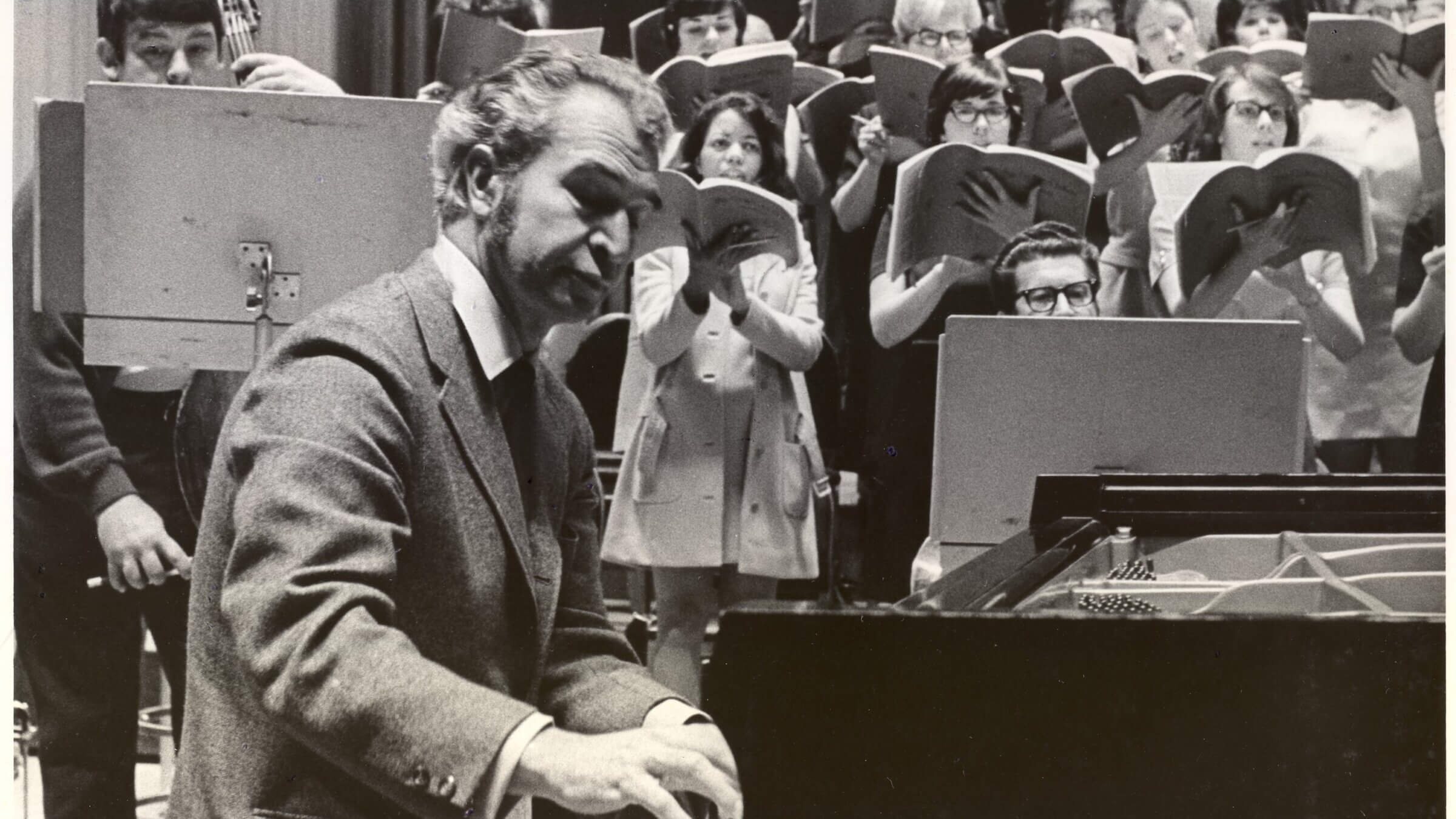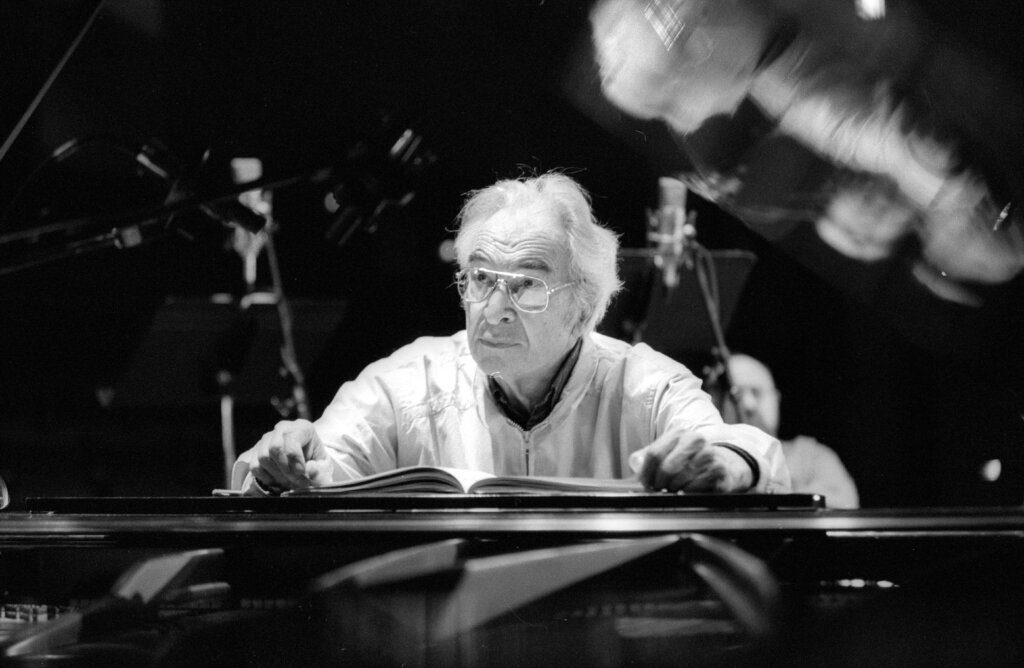How one of the giants of jazz composed a hymn for Black-Jewish unity
Dave Brubeck’s 1969 opus ‘Gates of Justice’ is on its way to UCLA

Dave Brubeck in a 1970 performance of Gates of Justice. Courtesy of Courtesy of the Brubeck Collection, Wilton Library
Shortly after Martin Luther King, Jr. was assassinated in 1968, Dave and Iola Brubeck hosted four rabbis at their home in Connecticut to discuss a new classical work.
The idea was to connect the Black American and Jewish experience at a moment when the groups’ historic coalition was showing signs of fraying. Brubeck, a celebrated jazz pianist and composer known for his hits “Take Five” and “Blue Rondo a La Turk,” wasn’t Black or Jewish. He took the job anyway and, in 1969, The Gates of Justice, a blend of gospel, cantorial motifs and jazz improvisation, drawing from biblical texts and the words of Dr. King, debuted at the Rockdale Temple in Cincinnati.
The work, which incorporates a choir, two soloists, a jazz trio and brass ensemble, has been performed just over 100 times, but not always as ambitiously as Brubeck intended. Even in the 2001 recording for the Milken Archive, which preserves recordings of music related to the American Jewish experience, the opening calls of the shofar were played by a French horn.
“Sometimes there’d be a great shofar player that you could trust,” Brubeck, who kept multiple shofars in his basement, said in a 2003 interview with the Milken Archive. “Not too often.”
On Feb. 26, at UCLA, audiences will hear a trumpet major play the shofar blast as part of a three-day event coordinated by the Herb Alpert School of Music and the Lowell Milken Center for Music of American Jewish Experience. Brubeck’s cantata will be heard alongside world premieres meditating on themes of racial justice; it will bookend a day-long conference about racial justice. In a first, Brubeck’s three sons will make up the jazz trio and the music will be brought to Holman United Methodist, a Black church.
Mark Kligman, director of the Milken Center, had been meaning to perform Gates of Justice as early as 2020, Brubeck’s centennial (he died in 2012 at the age of 91). The pandemic delayed the presentation, but Kligman finds the material’s call for Black and Jewish unity even more relevant now.
“Whenever we see in the news on a daily basis, these horrific, antisemitic, anti-Black, highly discriminatory, racist comments, it’s hard not to do anything related to it,” Kligman said. “A work like this gets us to that profound level to really evaluate who we are as human beings to really make a difference.”
Brubeck described the intricate structure of Gates of Justice as “a bridge,” with three related choral pieces, drawing its text from the Union Prayer Book and Psalms.
Anchoring the sections are two voices, a cantor, who sings the prophetic, melismatic tenor parts, and a Black baritone, imagined as “the newly awakened conscience of modern man.”

Phillip Bullock, who will sing the baritone part, said his research for the piece has helped him to make connections between the Black and Jewish experience in America.
“I’ve often noticed that, for a lot of Black communities, it’s very common that you hear references to previous struggles and how they mirror almost identically things that are happening now,” Bullock said in a phone call from LA. “It’s also interesting to me listening to some older people in Jewish communities speaking in a very similar way. Hearing antisemitism now, but then connecting it very quickly to things that happened 10 years ago, or 50 years ago, or 100 years ago.”
Azi Schwartz, cantor at Park Avenue Synagogue, sees Brubeck’s cantata as an extension of his interfaith work, and surprisingly accomplished in its encapsulation of cantorial motifs. What struck him as different was the text he’s singing, and its prophetic weight. Instead of the usual liturgy cantors have in their repertoire, Brubeck, guided by Rabbi Charles Mintz, who commissioned the work, drew from Solomon’s dedication of the Temple from the Book of Kings, which suggests the hope to start something new on old foundations.
“He wrote it in the ’60s, but there is a reason why it’s still very much relevant, and it’s actually relevant more than ever,” Schwartz said. “My hope is that there are more love stories that are created between people who say, ‘I never thought that this is how it is. I never really understood your community and what you’re going through every day and your struggles and your triumphs.”
Brubeck’s work shows its age in establishing a clear binary between Black and Jewish, at a time when a growing number of American Jews are people of color. The programmers acknowledged this, but emphasized that their goal in this performance wasn’t Jewish diversity, but Black inclusion.
“This was commissioned by a Jewish organization,” Jeff Janeczko, curator of the Milken Archive, said of the piece. “It doesn’t seem to have involved a large segment of the African American population. So we thought we wanted to really do that.”
The performance is drawing from within the greater community of Los Angeles, including the professional choir Tonality, UCLA students, members of local synagogues and Black singers in the choir. Tonality will also sing contemporary compositions, like Gerald Cohen’s I felt my legs were praying, which includes Hebrew and quotes from Abraham Joshua Heschel, and Jared Jenkins’ Democracy, with text by Langston Hughes.
Tonality’s founder and conductor, Alexander Lloyd Blake, said Brubeck’s piece is a unique opportunity to showcase the range of his choir — who can sing R&B, jazz and classical music — all in one work. He also sees it fitting well with Tonality’s mission to activate people to make change.
“What I have really loved about pieces like this is that it allows us to really, I think, engage realistically with what’s happening,” he said. “You can’t really sing about beauty and peace if you’re not singing about war and divisiveness and hate. In the piece we are asked as artists and singers to embody both of those extremes.”
A striking moment in the piece in the fifth movement, “Lord, Lord,” was originally a standalone composition. In it, the choir shouts racial epithets, which, conductor Neal Stulberg says, will be altered to a more universal “language of the mob” for our current moment.
Following the anti-Jewish and anti-Black outbursts, which interrupt a haunting, quiet melody, the baritone sings “Lord, when will the ill wind change? We’re all just little children crying in a world of hate for love, and still we wait for love, and still we wait!”
“My dad felt like it really was at the core heart of the dramatic curve of The Gates of Justice,” said Chris Brubeck, who accompanied his father on bass for a number of performances. In its place in the cantata, “Lord, Lord” brings the Psalmist’s lofty words, pleading for God to open the gates of justice, down to a place of real hurt.
Chris Brubeck said that his father’s deep concerns for civil rights followed him his entire life. While in the Army during the Battle of the Bulge, Brubeck was spared combat for his musical skills, and helped form an integrated band called the Wolf Pack.
When the bass player in Brubeck’s quartet, Eugene Wright, who was Black, wasn’t allowed to play most of the shows in their tour of the South, they canceled 23 out of 25 performances. Brubeck studied composition under Darius Milhaud, a French-Jewish refugee and the namesake of Brubeck’s eldest son.
Chris Brubeck, who is bringing his father’s shofars to be used in the performance, is excited to find new places to improvise with his brothers, and to see how an audience will receive the composition now.
“Are they gonna say, ‘Well, it’s just a historical piece, it’s a museum piece, you might as well be doing the Nutcracker?’ Or someone will say ‘Wow, that’s surprisingly on target’ or ‘Oh my God, this is still totally relevant. I thought we had changed for the better.’”
Chris Brubeck, a composer and musician, said he loved the “naiveté and sincerity” of his father’s music — the insistence that, wherever possible, the baritone for Gates of Justice, a Jewish commission that debuted at Jewish venues, be Black, and his conviction that music can actually change hearts and minds.
After his father died in 2012, Brubeck recalled a moment where the Brubeck Brothers Quartet played his mass, To Hope, at the Detroit Jazz Festival.
“I looked at the sky, and the clouds were just rolling by, and I know it’s corny as hell, but it just really had this feeling that Dave was lying on top of the piano in a cloud, on his elbow and watching from above,” Brubeck said. “This great feeling he had for humanity and mankind and the greatest higher aspirations of the thoughts that are in the Bible were being projected all over downtown Detroit with a great celebration.”
“I always think that God probably thought what he was getting when he created mankind was that kind of vibe: a great concert, people gathered to love music, instead of all the other crap that he got. And that’s what’s so beautiful about music: It helps affirm — nevermind the notes — the possibility of who we are as humanity, what we can do.”























